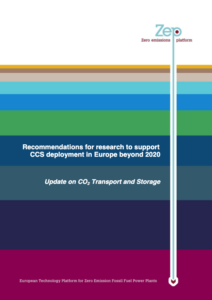In 2010, ZEP published its landmark report, “Recommendations for research to support the deployment of CCS in Europe beyond 2020”, which identified key R&D areas requiring support in order to drive down costs and accelerate deployment via well-targeted programmes. FP7-ENERGY calls have taken into account several key recommendations, proving various individual components of the CCS value chain. Much learning has been achieved and industry is today confident that CO2 transport and storage can be safely introduced on a commercial scale.
However, further targeted R&D is essential in areas that can significantly reduce costs and commercial risks. ZEP has therefore published an update on R&D priorities for CO2 capture, while this report covers R&D priorities for CO2 transport and storage, taking into account advances achieved to date. (N.B. These are prioritised independently of the source of capture.) ZEP has also published a separate report outlining the urgent need for up to six new large storage pilots, EU-wide.
Work on R&D priorities must be initiated now and/or continued in order to enable the wide deployment of CCS by 2030. This includes all the key development steps (laboratory – small/large pilot – demonstration – pre-commercial). To this end, CCS must be fully represented in Horizon 2020 as a critical low-carbon technology for delivering EU climate goals.
Download the ZEP report below.

